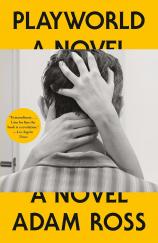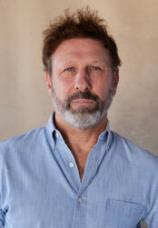Playworld
Review
Playworld
When a novelist who had a role in a major Hollywood film at age 12 and went on to devote himself to the sport of wrestling in high school creates a protagonist who shares those experiences, it’s tempting to read too much into obvious autobiographical correspondences. To whatever extent Adam Ross clearly has incorporated elements from his life into PLAYWORLD, the author of MR. PEANUT --- his previous novel and a New York Times Notable Book in 2010 --- has penned an endearing portrait of one teenager entering adulthood, even as that transition too frequently is occurring on terms dictated by his elders for reasons more intended to benefit them than him.
Beginning in the fall of 1980 and continuing for a year, PLAYWORLD follows the life of 14-year-old Griffin Hurt as he juggles the demands of his freshman year at Boyd Prep, a school near his apartment on Manhattan’s Upper West Side, alongside a blossoming acting career. His father, Shel (born Sheldon Hertzberg), is a trained opera singer and voice actor who teaches those skills. On his honeymoon with his wife Lily, a ballet and Pilates teacher who’s studying for a master’s degree in American literature at NYU, he traveled through Europe with Anthony Quinn as his voice coach.
"In Griffin, Ross has created a narrator whose voice is more than appealing enough to carry the story across 500 pages.... It’s impossible to leave him and a story that’s overflowing with life without wishing him well..."
His career launched by an appearance as a second-grader with Muhammad Ali on “Candid Camera,” Griffin’s credits include four seasons as superhero Peter Proton, one of the stars of the Saturday morning TV series “The Nuclear Family,” filmed on the same stage at Rockefeller Center as “Saturday Night Live.” Among other things, he has shared a dressing room with John Belushi, played Roy Scheider’s son in a thriller, and lands a role in a film starring Diane Lane and Jill Clayburgh, directed by a Woody Allen-like character, Alan Hornbeam. For all of his swift professional progress, it becomes clear that acting has never been a passion, especially when we learn that his ability to remain at his elite prep school depends on his earnings from that work.
But Griffin’s life becomes even busier when Naomi Shah, the 36-year-old wife of the wealthy owner of a textile company (the couple are close friends of Griffin’s parents) from Great Neck, begins showing up regularly outside the Juilliard School just as Griffin passes it on his way home from school and invites him into the back seat of her Mercedes. Their relationship becomes more intense and fraught when he moves into the Shahs’ home during the summer of 1981, after tension between his parents reaches the breaking point.
“Hers was a great comfort I could find nowhere else,” he recalls from the perspective of adulthood, “but securing it required I take on a specific role: one of a young man who seems outwardly confident but was inwardly unsure, a watchful boy so lacking in adult guidance he’d been forced, in nearly all matters, to improvise. Every time I saw her that year, I did the very thing required of me whenever I stepped in front of the camera: I played myself.”
Griffin’s encounters with Naomi aren’t the only source of pressure in his young life. As he battles to maintain his eligibility to wrestle in the 121-pound weight class, he must deal with the predatory behavior of his coach. In one match after another, Griffin suffers ignominious defeats, but those failures never seem to lessen his commitment to the sport.
Through it all, what accounts for much of PLAYWORLD’s appeal is the tension Ross establishes between how Griffin both suffers and benefits from manipulation by the adults in his life (who he comes to think of as “the ocean in which I swam”) and the otherwise utter normalcy of his day-to-day existence. Even as he’s engaging in his afternoon assignations with Naomi at a location he calls the “Dead Street” or studying his lines for his Alan Hornbeam role, he’s tooling around New York City on his bicycle. He creates a realm he calls Griffynweld for games of Dungeons & Dragons with his friends and fantasizing about his chances for a relationship with blond beauty Amanda West, whose prep school sits across the street from the Hornbeam movie set.
In Griffin, Ross has created a narrator whose voice is more than appealing enough to carry the story across 500 pages. He’s a writer who tends to extravagance, and one’s preference for that style will dictate how enjoyable some of his more descriptive and digressive passages will be --- like the encounter Griffin and several of his classmates have in Central Park’s Sheep Meadow with a man they connect with on a prank phone call who offers to instruct them on the meaning of life. His depiction of New York City is mostly affectionate, even at a time when the city was at less than its best. “Oh, but there is something fantastical about this island,” Griffin muses, and it would be hard to disagree with that based on its portrayal here, even as he identifies it as “a city that, for all intents and purposes, no longer exists.”
In the context of his incipient wrestling career, Griffin acknowledges that what he wanted most was to “dictate my own destiny, no matter who the opponent standing before me was,” or, as the analyst he sees every Saturday morning urges him, “to come up with a language for your life.” By the end of PLAYWORLD, he has made some fateful decisions about his future that seem to move him in that direction. It’s impossible to leave him and a story that’s overflowing with life without wishing him well in that quest.
Reviewed by Harvey Freedenberg on January 17, 2025
Playworld
- Publication Date: February 24, 2026
- Genres: Fiction
- Paperback: 528 pages
- Publisher: Vintage
- ISBN-10: 0345807006
- ISBN-13: 9780345807007




